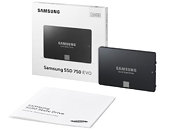- Joined
- Oct 9, 2007
- Messages
- 47,670 (7.43/day)
- Location
- Dublin, Ireland
| System Name | RBMK-1000 |
|---|---|
| Processor | AMD Ryzen 7 5700G |
| Motherboard | Gigabyte B550 AORUS Elite V2 |
| Cooling | DeepCool Gammax L240 V2 |
| Memory | 2x 16GB DDR4-3200 |
| Video Card(s) | Galax RTX 4070 Ti EX |
| Storage | Samsung 990 1TB |
| Display(s) | BenQ 1440p 60 Hz 27-inch |
| Case | Corsair Carbide 100R |
| Audio Device(s) | ASUS SupremeFX S1220A |
| Power Supply | Cooler Master MWE Gold 650W |
| Mouse | ASUS ROG Strix Impact |
| Keyboard | Gamdias Hermes E2 |
| Software | Windows 11 Pro |
Samsung launched the 750 EVO line of mainstream SSDs, designed for the OEM channel, particularly business desktops and notebooks. These 2.5-inch drives, featuring SATA 6 Gb/s interfaces, offer extended corporate warranty periods. Some models offer warranties as high as 6-year, others 5-year. The drives are available in two capacities, 120 GB and 250 GB, with variants based on warranty policy on offer. Under the hood, these drives offer a feature set similar to the 850 EVO series - up to 540 MB/s sequential reads, up to 520 MB/s sequential writes, 97,000 IOPS 4K random access for the 250 GB variant, and 94,000 IOPS random access for the 120 GB variant.

View at TechPowerUp Main Site

View at TechPowerUp Main Site
Last edited:




 and most consumers are replacing their entire computer every 3-5 years.
and most consumers are replacing their entire computer every 3-5 years.